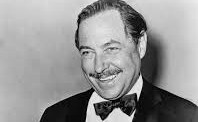08 March 2018
Summer and Smoke (Tennessee Williams)
Almeida Theatre (until 7 April)
Reviewed by William Morton
Star rating: ****
 Tennessee Williams was very prolific, writing approximately 30 major plays. After enjoying great success with The Glass Menagerie and A Street Car named Desire, his work fell out of favour to some extent, although he kept on writing until his death. Summer and Smoke was first staged in New York in 1948 and was not as well received as A Street Car named Desire, which preceded it. The play’s first performance in the UK only took place in 2006.
Tennessee Williams was very prolific, writing approximately 30 major plays. After enjoying great success with The Glass Menagerie and A Street Car named Desire, his work fell out of favour to some extent, although he kept on writing until his death. Summer and Smoke was first staged in New York in 1948 and was not as well received as A Street Car named Desire, which preceded it. The play’s first performance in the UK only took place in 2006.
The plot, set in the early years of the twentieth century, concerns the love of a priest’s daughter, Alma Winemiller, for Johnny, the son of Dr Buchanan who lives next door. Alma is a nervy and unworldly girl, whose life is devoted to music and singing and looking after her parents as her mother has gone mad. She also runs a small literary discussion group.
Alma is Spanish for ‘soul’, and Johnny by contrast represents the body, emphasised by the fact that he becomes a doctor like his father. There is a connection between Alma and Johnny from a young age but they are not able to communicate properly, in particular because of her innocence. After qualifying as a doctor, Johnny returns home and takes up with Rosa, the very worldly daughter of the owner of a bar outside the town, and generally misbehaves but makes some attempt to try and discover what Alma is after. When she finally realises that her love has a physical side and says this, Johnny rejects her. After his father is shot by Rosa’s father, Johnny, a changed man, leaves town and works in a fever hospital.
Alma, who had some responsibility for the events leading to the death of Doctor Buchanan, has a nervous breakdown. When she recovers, she meets Nellie, one of her old piano pupils, who gives her a present from herself and Johnny and it becomes apparent they are engaged. In the final scene, Alma picks up a travelling salesman and sets off with him for the bar (with rooms) Johnny used to frequent.
The play is imaginatively staged with the actors, when they are not required, sitting with their backs to the audience at a semi-circle of pianos which are played to accompany the action on stage. The two leads, Patsy Ferran as Alma and Matthew Needham, are excellent. The former wonderfully portrays the mildly hysterical and other-world nature of Alma. She is, for example, distraught when Johnny tells her people make fun of her singing. He does equally well as the all-American boy into broads and booze but still intrigued by Alma’s interest and to some degree respectful of her. Anjana Vasan, who plays both Rosa and Nellie with a fine distinction between them, is also very good. Other actors play several parts but it can take a moment or so to realise, for instance, that it is gossipy Mrs Bassett speaking and not Alma’s mad mother.
Perhaps not the greatest play but the production is well worth seeing, in particular for the performance of the leads.

